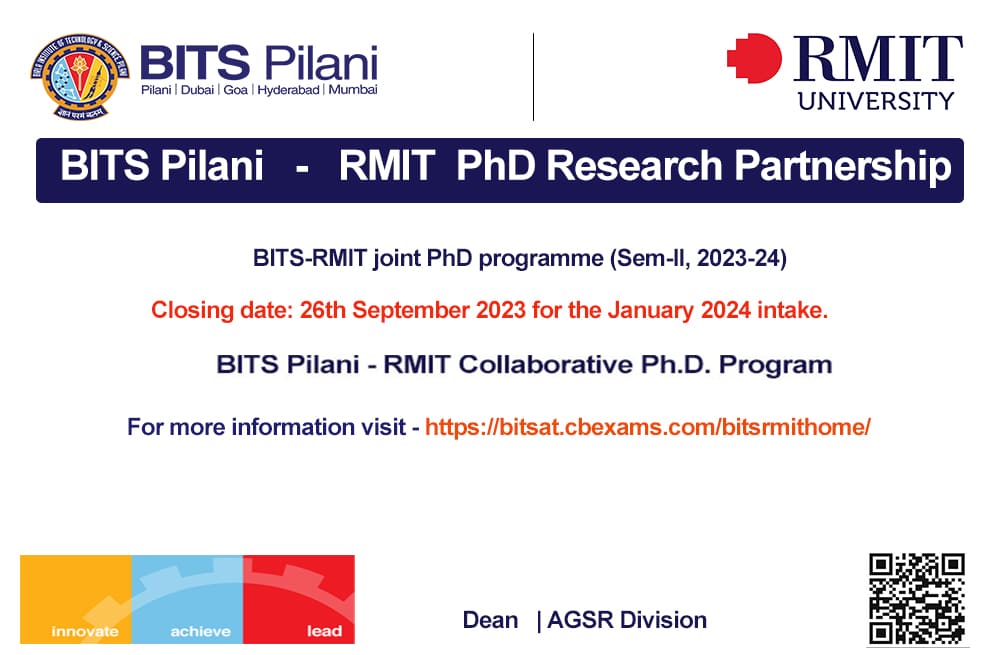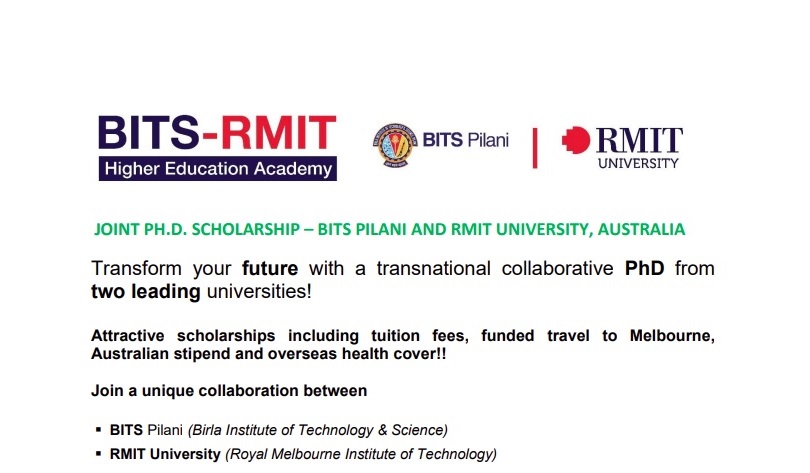Ph.D. positions in Civil and Environment Engineering are currently available with a full scholarship for students enrolled in a Joint Ph.D. program at the BITS Pilani, and RMIT University, Australia.
Application Deadline: September 26, 2023, for January 2024 intake
How to Apply: Send in your complete application using the following link:
Visit: https://bitsat.cbexams.com/bitsrmithome/
Desirable qualifications needed:
M.Tech/M.E./M.Sc. in Civil/Structural/ Materials Science Engineering or similar fields.
Candidates having eagerness to research cement and concrete, good English writing skills, knowledge of material characterization, knowledge and experience of concrete casting and testing, would be preferred.
HIGHLIGHTS OF THE SCHOLARSHIP
For candidates enrolled in a Joint Ph.D. between RMIT University and BITS Pilani:
- BITS Pilani Ph.D. fellowship:
- INR 45,800/- per month for student with a higher degree of BITS Pilani or its equivalent
- INR 42,800/- per month for student with an integrated first degree of BITS Pilani or its equivalent
- Receive a full RMIT tuition fee scholarship for the duration of your enrolment
- Benefit from the world – class research facilities in India and Melbourne
- Travel to Australia for up to one year of candidature and be supported by an Australian stipend for the duration of your time in Melbourne.
- Candidates admitted to the program are jointly supervised by faculty from BITS and RMIT.
PROJECT DETAILS
Project ID: BITSRMIT24101168
Project title: Low Energy Buildings Using Locally Produced Cleaner Cement
Project Team: Mukund Lahoti, BITS Pilani | Sathees Nava, RMIT University, Australia
Description: As we transit to clean energy materials and systems, development of efficient materials with reduced CO2 emissions is vital yet an often-overlooked mitigation solution. Ordinary Portland cement (OPC) is chief among the building materials for modern infrastructure development and its demand is incessantly rising. Unfortunately, OPC is a highly energy-intensive material, resulting in soaring energy consumptions and CO2 emissions. Alternative low-carbon binders such as geopolymer binder are thus greatly sought after. Thus, the objective 1 is to develop much greener geopolymer cement using locally available agricultural and industrial wastes such as sugarcane bagasse ash, fly ash, glass and footwear industry wastes. Efforts would be to even replace the conventionally used silicates in geopolymer. Thus, by developing an efficient material, energy, and emissions impact owing to energy intensive OPC production can be minimized. A comprehensive parametric study would be conducted, and through efficient mix design the need of high temperature/moisture curing would also be eliminated.
The objective 2 is to conduct life cycle assessment of building blocks produced using this green geopolymer cement. Emissions and greenness can be estimated by the life cycle assessment (LCA) tool. It is crucial to understand the economic and environmental impacts to realize the feasibility of the developed
product/system for commercial application. Although geopolymer is concerned as greener concrete, only a few studies have quantified the environmental impact.
Thus, on one hand we aim to improve the material greenness by utilizing local materials/wastes and on the other hand through mix-design tailoring and LCA we aim to further improvise the material efficacy towards a low energy building system.
For more information write to: mukund.lahoti@pilani.bits-pilani.ac.in


 An Institute of Eminence
An Institute of Eminence









